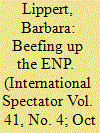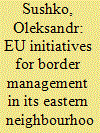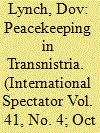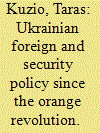|
|
|
Sort Order |
|
|
|
Items / Page
|
|
|
|
|
|
|
| Srl | Item |
| 1 |
ID:
075250


|
|
|
|
|
| Publication |
2006.
|
| Summary/Abstract |
Lippert examines more broadly EU policies towards its eastern neighbours, suggesting an alternative model with which to embed these countries in the EU system of governance. Lippert argues that a path dependency and the lack of a foreign policy focus lie at the root of the inbuilt fallacies of the ENP. Indeed, the ENP in principle purports to envisage a new type of relationship, distinct from the model of economic integration (for example, the European Economic Area) or that of accession or of association/partnership. Yet in practice, having been articulated as a form of "membership minus" that denies any form of institutional participation, the ENP cannot significantly contribute to the modernisation and stabilisation objectives to which it aspires. To escape this bind, Lippert suggests that, for those eastern neighbours who could in principle have the option of membership but are in practice far removed from it, the EU, in addition to its bilateral contractual ties, should establish an overarching institutional framework: a European Confederation of Tasks (Confed Europe). Confed Europe could act as an institutional process, tackling and striving to reach a common purpose on key policy issues in the political, economic and security realms.
|
|
|
|
|
|
|
|
|
|
|
|
|
|
|
|
| 2 |
ID:
075251


|
|
|
|
|
| Publication |
2006.
|
| Summary/Abstract |
The last article is an opinion by Roberto Aliboni on the implications of the Lebanon war in the summer of 2006. Aliboni casts the war in Lebanon within a wider Middle Eastern context, examining its relation to key crises such as the war in Iraq, the escalating Western tensions with Iran, and the Israeli-Palestinian conflict. He argues that recent events have brought about three fundamental geopolitical changes in the region. First, the rise of Shiite forces in Iraq and Lebanon. Second, the strengthening of non-Arab states such as Iran, Turkey and Israel. And third an accompanying weakening of pro-Western Arab states. This new geopolitical setting opens up two options for a Western strategy in the region. The first would see a continuation of the current US policy of confrontation, in which the West persists in its alliance with the "losing Arab parties" and fuels further resentment against it in the region. The second option is to tackle the root causes of this resentment, supporting helping to strengthen pro-Western forces in the Middle East. This second option favoured by the author calls for a concrete and credible Western effort to promote an Israeli-Palestinian and Israeli-Arab peace process, a need made ever more pressing by the European peacekeeping mission in Lebanon.
|
|
|
|
|
|
|
|
|
|
|
|
|
|
|
|
| 3 |
ID:
075245


|
|
|
|
|
| Publication |
2006.
|
| Summary/Abstract |
Kataryna Wolczuk and Taras Kuzio focus on Ukraine. Wolczuk's essay analyses the domestic political situation in post-Orange revolution Ukraine. Despite the heightened pro-European credentials of post-revolution Ukraine, Wolczuk explains how the revolution has not engendered a breakthrough in EU-Ukraine relations. This has left the new regime in Ukraine to tackle, without an EU membership perspective, formidable domestic reform challenges in the political, economic and institutional realms. This domestic quest became significantly harder in the light of divisions within the "Orange elite", the ensuing 2006 parliamentary election results, the volatile coalition politics that followed, and the new constitutional framework. Wolczuk then analyses the impact of Ukraine's changing domestic politics on EU relations. While democratic change seems irreversible and EU-Ukraine relations have undergone a visible upgrading, the country's tumultuous politics have drawn attention away from the commitment to pursue the reforms indicated in Ukraine's ENP Action Plan. They have also imbued the domestic political system with greater uncertainty and nuance as far as the country's EU orientation is concerned.
|
|
|
|
|
|
|
|
|
|
|
|
|
|
|
|
| 4 |
ID:
075247


|
|
|
|
|
| Publication |
2006.
|
| Summary/Abstract |
Oleksander Sushko turns more generally to the EU's policies towards the neighbouring east. The focus of Sushko's analysis is on border management. The author analyses the impact and effectiveness of EU initiatives towards the east on border management goals, as elaborated in the ENP. These goals seek to foster an open and cooperative eastern border, while concomitantly ensuing its security, transparency and control. In relation to the border management question, Sushko analyses three new EU policy initiatives in the region: the EU's upgraded role in the Transnistrian conflict, the EU Border Assistance Mission to Ukraine and Moldova and the EU's role in the new Moldova-Ukraine customs regime. The author concludes that these new initiatives prove that only through intense and multifaceted involvement can the EU realistically aspire to engendering constructive domestic and regional change, which could in turn contribute to the fulfilment of the EU's border objectives.
|
|
|
|
|
|
|
|
|
|
|
|
|
|
|
|
| 5 |
ID:
075249


|
|
|
|
|
| Publication |
2006.
|
| Summary/Abstract |
Nathalie Tocci analyses another "frozen conflict" hub in the former Soviet space, namely Georgia's conflicts with Abkhazia and South Ossetia, focussing on the EU's impact on these two conflicts. As in the case of Transnistria, Georgia's conflicts have been afflicted by a paradoxical mix of international neglect, and competing mediation by Russia, the US and international organisations. The EU plays a minimal role in the South Caucasus, and as such it could not have fundamentally influenced conflict resolution in the region. Yet despite its loose contractual ties with Georgia and its modest levels of aid to the region, the EU's peacemaking potential has not been fully met. Beyond an insufficient degree of involvement, the EU has self-constrained its actions due to its insufficient interest in the region on the one hand, and its deference to Russia on the other.
|
|
|
|
|
|
|
|
|
|
|
|
|
|
|
|
| 6 |
ID:
075248


|
|
|
|
|
| Publication |
2006.
|
| Summary/Abstract |
Turning to Moldova, Dov Lynch analyses how and why the conflict in Transnistria remains unresolved. The "frozen" nature of the peace process in the Moldova-Transnistria conflict is due to a set of local, national, regional and international factors. These include the separatist platform of the Transnistrian leadership on the one hand and the weakness of the Moldovan state on the other. Regional and international factors fuelling the stalemate include Russian interests, Ukrainian ambiguity, and the international community's relative neglect, all of which have contributed to a distorted and cumbersome process of international peacekeeping and mediation. Yet Lynch discusses how several of these factors are undergoing a process of deep-rooted evolution. Hence, while the peace process remains frozen, the conflict itself is not. The foreign policy shift of the Moldovan government since 2003, the hardening stance of the Transnistrian authorities, the increased assertiveness of Russia, the growing involvement of the enlarged EU and the regime change in Ukraine have all altered the state of play in the conflict. The ensuing unfreezing of the status quo presents both risks and opportunities. In order to capitalise on the latter, Lynch sets forth several guidelines for EU policy in the region.
|
|
|
|
|
|
|
|
|
|
|
|
|
|
|
|
| 7 |
ID:
075246


|
|
|
|
|
| Publication |
2006.
|
| Summary/Abstract |
Kuzio instead focuses on the foreign policy in post-revolution Ukraine. The centre of Kuzio's analysis is Ukraine's EU and NATO trajectories. He first analyses Yushchenko's EU and NATO orientations and commitments, which marked a decisive shift from the ambiguous stance of the previous regime. He then surveys the respective positions within the political party system and the public at large on these two foreign policy questions. He concludes that NATO's "open-door policy" as opposed to the EU's policy of passivity and reticence has produced a difference in Ukraine's move towards the former as opposed to the latter. However, the Ukrainian political system and public remain far more reluctant and uncertain about the desirability of NATO with respect to EU membership, casting the country's foreign policy in a potential state of flux.
|
|
|
|
|
|
|
|
|
|
|
|
|
|
|
|
|
|
|
|
|